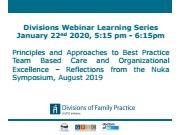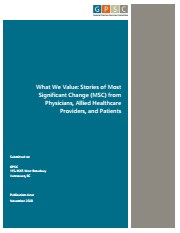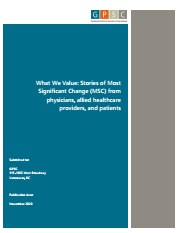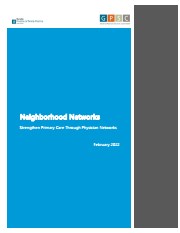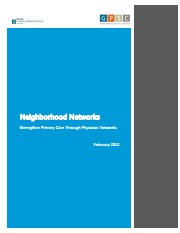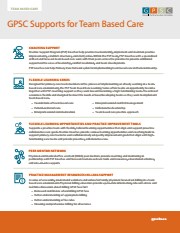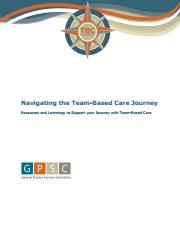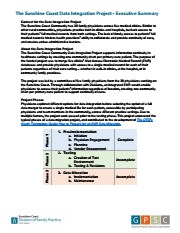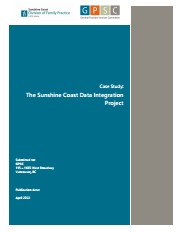11 public records – page 1 of 1. — Log in to view all records
Principles and Approaches to Best Practice Team Based Care and Organizational Excellence – Reflections from the Nuka Symposium, August 2019 - Recording
https://www.jcc-resourcecatalogue.ca/en/permalink/divisionresource1537
- Published Date
- 2020-01-22
- Link to File
- /media/divresources/PrinciplesApproachestoBestPracticeTBC_ReflectionsfromtheNukaSymposium_recording.mp4
- Description
- "This is the recording of the Principles and Approaches to Best Practice Team Based Care and Organizational Excellence – Reflections from the Nuka Symposium, August 2019 webinar held January 22, 2020."
- Corporate Author
- General Practice Services Committee
- Personal Author
- Dr Bonnie Bagdan Dr Dan Horvat Dr Alan Ruddiman Dr Tim Troughton
- Published Date
- 2020-01-22
- Topics
- Team-Based Care
- Primary Care
- Patient Medical Home
- Primary Care Network
- First Nations
- Engagement
- Governance
- Event
- Divisions Webinar Learning Series
- Resource Type
- Audio Recording
- Video Recording
- File Type
- MP4
- Link to File
- /media/divresources/PrinciplesApproachestoBestPracticeTBC_ReflectionsfromtheNukaSymposium_recording.mp4
- Recording Length
- 59mins 13secs
- Description
- This is the recording of the Principles and Approaches to Best Practice Team Based Care and Organizational Excellence – Reflections from the Nuka Symposium, August 2019 webinar held January 22, 2020.
Principles and Approaches to Best Practice Team Based Care and Organizational Excellence – Reflections from the Nuka Symposium, August 2019 - Presentation
https://www.jcc-resourcecatalogue.ca/en/permalink/divisionresource1538
- Published Date
- 2020-01-22
- Description
- " Southcentral Foundation has had tremendous success in improving primary care from a quadruple aim perspective. In August 2019 a cohort of 19 attended a symposium created for BC participants to learn about their Nuka Model of Care.The webinar, hosted by Dr Dan Horvat along with a panel of Physicians who also attended, presented on the key learnings and how they can be applied in BC. This is the slide deck used during the Principles and Approaches to Best Practice Team Based Care and Organizational Excellence – Reflections from the Nuka Symposium, August 2019 webinar held on January 22, 2020."
- Corporate Author
- General Practice Services Committee
- Personal Author
- Dr Bonnie Bagdan Dr Dan Horvat Dr Alan Ruddiman Dr Tim Troughton
- Published Date
- 2020-01-22
- Topics
- Primary Care
- Patient Medical Home
- Primary Care Network
- Engagement
- First Nations
- Governance
- Team-Based Care
- Event
- Divisions Webinar Learning Series
- Resource Type
- Presentation
- File Type
- Description
- Southcentral Foundation has had tremendous success in improving primary care from a quadruple aim perspective. In August 2019 a cohort of 19 attended a symposium created for BC participants to learn about their Nuka Model of Care.The webinar, hosted by Dr Dan Horvat along with a panel of Physicians who also attended, presented on the key learnings and how they can be applied in BC. This is the slide deck used during the Principles and Approaches to Best Practice Team Based Care and Organizational Excellence – Reflections from the Nuka Symposium, August 2019 webinar held on January 22, 2020.
PCN Team Charting Agreement Informational Webinar - Recording
https://www.jcc-resourcecatalogue.ca/en/permalink/divisionresource1552
- Published Date
- 2020-03-10
- Description
- "This is the audio recording from the PCN Team Charting Agreement informational webinar held on March 10, 2020."
- Corporate Author
- General Practice Services Committee
- Personal Author
- Dr Jaron Easterbrook Alison Pearce
- Published Date
- 2020-03-10
- Resource Type
- Audio Recording
- File Type
- MP4
- Description
- This is the audio recording from the PCN Team Charting Agreement informational webinar held on March 10, 2020.
What We Value: Stories of Most Significant Change (MSC) from Physicians, Allied Healthcare Providers, and Patients (Executive Summary)
https://www.jcc-resourcecatalogue.ca/en/permalink/divisionresource1565
- Division
- Central Okanagan Division of Family Practice
- Kootenay Boundary Division of Family Practice
- North Peace Division of Family Practice
- North Shore Division of Family Practice
- South Island Division of Family Practice
- South Okanagan Similkameen Division of Family Practice
- Sunshine Coast Division of Family Practice
- Published Date
- 2020-11
- Description
- "The PMH Most Significant Change Evaluation describes the changes that resulted from Patient Medical Home (PMH) strategies such as the implementation of team-based care with allied health professionals (i.e., pharmacists and social workers), and clarifies the values held by different stakeholders in primary care transformation. The executive summary contains priority next steps for system actors (GPSC, Divisions, and FPs) to address."
- Division
- Central Okanagan Division of Family Practice
- Kootenay Boundary Division of Family Practice
- North Peace Division of Family Practice
- North Shore Division of Family Practice
- South Island Division of Family Practice
- South Okanagan Similkameen Division of Family Practice
- Sunshine Coast Division of Family Practice
- Corporate Author
- General Practice Services Committee
- Published Date
- 2020-11
- Resource Type
- Summary
- File Type
- Description
- The PMH Most Significant Change Evaluation describes the changes that resulted from Patient Medical Home (PMH) strategies such as the implementation of team-based care with allied health professionals (i.e., pharmacists and social workers), and clarifies the values held by different stakeholders in primary care transformation. The executive summary contains priority next steps for system actors (GPSC, Divisions, and FPs) to address.
What We Value: Stories of Most Significant Change (MSC) from Physicians, Allied Healthcare Providers, and Patients (Executive Summary)
https://www.jcc-resourcecatalogue.ca/en/permalink/divisionresource1566
- Division
- Central Okanagan Division of Family Practice
- Kootenay Boundary Division of Family Practice
- North Peace Division of Family Practice
- North Shore Division of Family Practice
- South Island Division of Family Practice
- South Okanagan Similkameen Division of Family Practice
- Sunshine Coast Division of Family Practice
- Published Date
- 2020-11
- Description
- "The PMH Most Significant Change Evaluation describes the changes that resulted from Patient Medical Home (PMH) strategies such as the implementation of team-based care with allied health professionals (i.e., pharmacists and social workers). By collecting, sharing, and reflecting on PMH stories from across BC, this project identifies common and different values held by different stakeholder groups in the BC health system."
- Division
- Central Okanagan Division of Family Practice
- Kootenay Boundary Division of Family Practice
- North Peace Division of Family Practice
- North Shore Division of Family Practice
- South Island Division of Family Practice
- South Okanagan Similkameen Division of Family Practice
- Sunshine Coast Division of Family Practice
- Corporate Author
- General Practice Services Committee
- Published Date
- 2020-11
- Resource Type
- Case Study
- File Type
- Description
- The PMH Most Significant Change Evaluation describes the changes that resulted from Patient Medical Home (PMH) strategies such as the implementation of team-based care with allied health professionals (i.e., pharmacists and social workers). By collecting, sharing, and reflecting on PMH stories from across BC, this project identifies common and different values held by different stakeholder groups in the BC health system.
Burnaby DoFP Neighbourhood Networks Case Study - Executive Summary
https://www.jcc-resourcecatalogue.ca/en/permalink/divisionresource1605
- Division
- Burnaby Division of Family Practice
- Published Date
- 2022-02
- Description
- "This document is the executive summary of the Burnaby DoFP Neighbourhood Networks case study. As part of GPSC commitment to the development of physician networks as a key component of primary care system change, the Burnaby DoFP Neighborhood Network case study explores the development and implementation of three neighborhood networks in Burnaby. The creation of neighborhood networks in Burnaby was prompted by family physicians who recognized the need to bring together family physicians from across local communities to increase their interconnectedness, provide opportunities for local Primary Care Network planning, and enable methods for sharing care with each other with the goal of improving patient access to medical care across Burnaby. Burnaby’s neighborhood networks have supported family physicians to connect socially, learn from each other, identify options for locum coverage and after-hours care, and support referrals to specialist care throughout the networks. Key outcomes: family physicians were able to increase patients’ access to care by referring patients to their family physician peers, expanding their use of locums, working on the development of an Urgent and Primary Care Clinic, and procuring additional healthcare resources for the neighborhood networks. A discussion of the neighborhood network's future goals and next steps is included."
- Division
- Burnaby Division of Family Practice
- Corporate Author
- General Practice Services Committee
- Published Date
- 2022-02
- Resource Type
- Summary
- File Type
- Description
- This document is the executive summary of the Burnaby DoFP Neighbourhood Networks case study. As part of GPSC commitment to the development of physician networks as a key component of primary care system change, the Burnaby DoFP Neighborhood Network case study explores the development and implementation of three neighborhood networks in Burnaby. The creation of neighborhood networks in Burnaby was prompted by family physicians who recognized the need to bring together family physicians from across local communities to increase their interconnectedness, provide opportunities for local Primary Care Network planning, and enable methods for sharing care with each other with the goal of improving patient access to medical care across Burnaby. Burnaby’s neighborhood networks have supported family physicians to connect socially, learn from each other, identify options for locum coverage and after-hours care, and support referrals to specialist care throughout the networks. Key outcomes: family physicians were able to increase patients’ access to care by referring patients to their family physician peers, expanding their use of locums, working on the development of an Urgent and Primary Care Clinic, and procuring additional healthcare resources for the neighborhood networks. A discussion of the neighborhood network's future goals and next steps is included.
Burnaby DoFP Neighbourhood Networks Case Study - Full Report
https://www.jcc-resourcecatalogue.ca/en/permalink/divisionresource1606
- Division
- Burnaby Division of Family Practice
- Published Date
- 2022-02
- Description
- "This document details the full case study on the Burnaby DoFP Neighborhood Networks. As part of GPSC commitment to the development of physician networks as a key component of primary care system change, the Burnaby DoFP Neighborhood Network case study explores the development and implementation of three neighborhood networks in Burnaby. The creation of neighborhood networks in Burnaby was prompted by family physicians who recognized the need to bring together family physicians from across local communities to increase their interconnectedness, provide opportunities for local Primary Care Network planning, and enable methods for sharing care with each other with the goal of improving patient access to medical care across Burnaby. Burnaby’s neighborhood networks have supported family physicians to connect socially, learn from each other, identify options for locum coverage and after-hours care, and support referrals to specialist care throughout the networks. Key outcomes: family physicians were able to increase patients’ access to care by referring patients to their family physician peers, expanding their use of locums, working on the development of an Urgent and Primary Care Clinic, and procuring additional healthcare resources for the neighborhood networks. A discussion of the neighborhood network's future goals and next steps is included."
- Division
- Burnaby Division of Family Practice
- Corporate Author
- General Practice Services Committee
- Published Date
- 2022-02
- Resource Type
- Case Study
- File Type
- Description
- This document details the full case study on the Burnaby DoFP Neighborhood Networks. As part of GPSC commitment to the development of physician networks as a key component of primary care system change, the Burnaby DoFP Neighborhood Network case study explores the development and implementation of three neighborhood networks in Burnaby. The creation of neighborhood networks in Burnaby was prompted by family physicians who recognized the need to bring together family physicians from across local communities to increase their interconnectedness, provide opportunities for local Primary Care Network planning, and enable methods for sharing care with each other with the goal of improving patient access to medical care across Burnaby. Burnaby’s neighborhood networks have supported family physicians to connect socially, learn from each other, identify options for locum coverage and after-hours care, and support referrals to specialist care throughout the networks. Key outcomes: family physicians were able to increase patients’ access to care by referring patients to their family physician peers, expanding their use of locums, working on the development of an Urgent and Primary Care Clinic, and procuring additional healthcare resources for the neighborhood networks. A discussion of the neighborhood network's future goals and next steps is included.
GPSC Supports for Team Based Care - Overview
https://www.jcc-resourcecatalogue.ca/en/permalink/divisionresource1607
- Published Date
- 2022
- Description
- "This document provides a brief overview of all the supports offered by the GPSC to support the transition of primary care practices to team based care."
- Corporate Author
- General Practice Services Committee
- Published Date
- 2022
- Topics
- Team-Based Care
- Resource Type
- Summary
- File Type
- Description
- This document provides a brief overview of all the supports offered by the GPSC to support the transition of primary care practices to team based care.
Navigating the Team-Based Care Journey - Guide to GPSC TBC Resources
https://www.jcc-resourcecatalogue.ca/en/permalink/divisionresource1611
- Published Date
- 2022-03
- Description
- "Team-based care is being established by diverse groups such as practices and providers, communities, and health leaders planning primary care networks. This Guide to GPSC TBC Resources is for all audiences interested in developing and implementing TBC. The Guide provides tangible steps and support for all stages throughout the implementation and improvement of TBC, from engaging and exploring, preparing, implementing, and strengthening and sustaining TBC. Resources in the Guide include tools that can be used independently or with training or coaching opportunities described in the Guide."
- Corporate Author
- General Practice Services Committee
- Published Date
- 2022-03
- Topics
- Team-Based Care
- Resource Type
- Guide
- File Type
- Description
- Team-based care is being established by diverse groups such as practices and providers, communities, and health leaders planning primary care networks. This Guide to GPSC TBC Resources is for all audiences interested in developing and implementing TBC. The Guide provides tangible steps and support for all stages throughout the implementation and improvement of TBC, from engaging and exploring, preparing, implementing, and strengthening and sustaining TBC. Resources in the Guide include tools that can be used independently or with training or coaching opportunities described in the Guide.
Sunshine Coast Data Integration - Executive Summary
https://www.jcc-resourcecatalogue.ca/en/permalink/divisionresource1618
- Division
- Sunshine Coast Division of Family Practice
- Published Date
- 2022
- Description
- "This is the executive summary for the Sunshine Coast Data Integration Case Study. The Sunshine Coast Data Integration Case Study explores work done to advance data integration across five primary care clinics using Med Access EMR. The project involved 38 family physicians on the Sunshine Coast who desired a technical solution to lacking information continuity for their patients, who they often see across multiple primary care settings with separate EMRs. While the project work stalled due to technical problems that emerged during the vendor engagement step, the case study offers previously unavailable insight into the expected project phases for large-scale data integration work, and typical challenges and enablers that might impede or maintain such initiatives."
- Division
- Sunshine Coast Division of Family Practice
- Corporate Author
- General Practice Services Committee
- Published Date
- 2022
- Topics
- Patient Medical Home
- Evaluation
- Resource Type
- Summary
- File Type
- Description
- This is the executive summary for the Sunshine Coast Data Integration Case Study. The Sunshine Coast Data Integration Case Study explores work done to advance data integration across five primary care clinics using Med Access EMR. The project involved 38 family physicians on the Sunshine Coast who desired a technical solution to lacking information continuity for their patients, who they often see across multiple primary care settings with separate EMRs. While the project work stalled due to technical problems that emerged during the vendor engagement step, the case study offers previously unavailable insight into the expected project phases for large-scale data integration work, and typical challenges and enablers that might impede or maintain such initiatives.
Sunshine Coast Data Integration - Case Study
https://www.jcc-resourcecatalogue.ca/en/permalink/divisionresource1619
- Division
- Sunshine Coast Division of Family Practice
- Published Date
- 2022-04
- Description
- "This is the full case study report for the Sunshine Coast Data Integration Case Study. The Sunshine Coast Data Integration Case Study explores work done to advance data integration across five primary care clinics using Med Access EMR. The project involved 38 family physicians on the Sunshine Coast who desired a technical solution to lacking information continuity for their patients, who they often see across multiple primary care settings with separate EMRs. While the project work stalled due to technical problems that emerged during the vendor engagement step, the case study offers previously unavailable insight into the expected project phases for large-scale data integration work, and typical challenges and enablers that might impede or maintain such initiatives."
- Division
- Sunshine Coast Division of Family Practice
- Corporate Author
- General Practice Services Committee
- Published Date
- 2022-04
- Topics
- Patient Medical Home
- Evaluation
- Resource Type
- Case Study
- File Type
- Description
- This is the full case study report for the Sunshine Coast Data Integration Case Study. The Sunshine Coast Data Integration Case Study explores work done to advance data integration across five primary care clinics using Med Access EMR. The project involved 38 family physicians on the Sunshine Coast who desired a technical solution to lacking information continuity for their patients, who they often see across multiple primary care settings with separate EMRs. While the project work stalled due to technical problems that emerged during the vendor engagement step, the case study offers previously unavailable insight into the expected project phases for large-scale data integration work, and typical challenges and enablers that might impede or maintain such initiatives.

